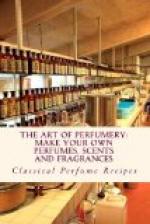Chemically considered, tonquin beans are very interesting, containing, when fresh, a fragrant volatile otto (to which their odor is principally due), benzoic acid, a fat oil and a neutral principal—Coumarin. In perfumery they are valuable, as, when ground, they form with other bodies an excellent and permanent sachet, and by infusion in spirit, the tincture or extract of tonquin enters into a thousand of the compound essences; but on account of its great strength it must be used with caution, otherwise people say your perfume is “snuffy,” owing to the predominance of the odor and its well-known use in the boxes of those who indulge in the titillating dust.
[Illustration: Tonquin.]
EXTRACT OF TONQUIN.
Tonquin beans, 1 lb.
Rectified spirit, 1 gallon.
Digest for a month at a summer heat. Even after this maceration they are still useful when dried and ground in those compounds known as POT POURRI, OLLA PODRIA, &c. The extract of tonquin, like extract of orris and extract of vanilla, is never sold pure, but is only used in the manufacture of compound perfumes. It is the leading ingredient in Bouquet du Champ—The field Bouquet—the great resemblance of which to the odor of the hay-field, renders it a favorite to the lovers of the pastoral.
TUBEROSE.—One of the most exquisite odors with which we are acquainted is obtained by enfleurage from the tuberose flower. It is, as it were, a nosegay in itself, and reminds one of that delightful perfume observed in a well-stocked flower-garden at evening close; consequently it is much in demand by the perfumers for compounding sweet essences.
EXTRACT OF TUBEROSE.
Eight pounds of No. 24 tuberose pomatum, cut up very fine, is to be placed into 1 gallon of the best rectified spirit. After standing for three weeks or a month at summer heat, and with frequent agitation, it is fit to draw off, and being strained through cotton wool, is ready either for sale or use in the manufacture of bouquets.
This essence of tuberose, like that of jasmine, is exceedingly volatile, and if sold in its pure state quickly “flies off” the handkerchief; it is therefore necessary to add some fixing ingredient, and for this purpose it is best to use one ounce of extract of orris, or half an ounce of extract of vanilla, to every pint of tuberose.
VANILLA.—The pod or bean of the Vanilla planifolia yields a perfume of rare excellence. When good, and if kept for some time, it becomes covered with an efflorescence of needle crystals possessing properties similar to benzoic acid, but differing from it in composition. Few objects are more beautiful to look upon than this, when viewed by a microscope with the aid of polarized light.
[Illustration: Vanilla.]
EXTRACT OF VANILLA.
Vanilla pods, 1/2 lb.
Rectified spirit, 1 gallon.




